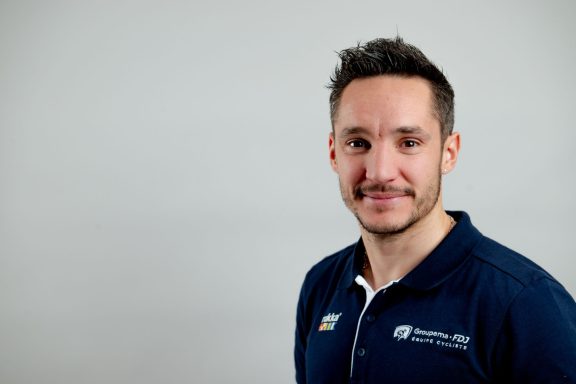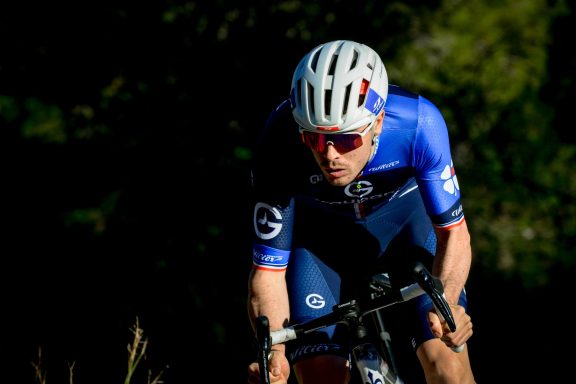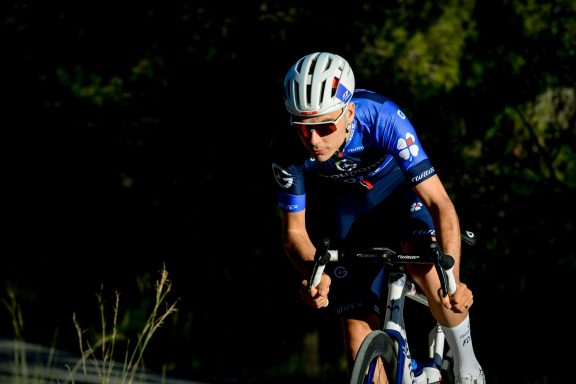After having worn the Groupama-FDJ’s colours as riders, several people are now working within the organization in various positions. Changing careers through the team may seem logical, but it is never insignificant. We met several of these former riders. Today, we sat down with Cédric Pineau, now in charge of hospitality.
Cédric, what was your approach regarding the career change?
During my rider’s career, I never looked too much further, I always remained focused on the current moment, on what I had to do as a cyclist on a daily basis. It is with time, and when you start to have health issues like I did, that you get to ask yourself some questions. You then wonder in which field you could go, if you still like what you learned at school. When I started to feel the end coming, with my iliac artery problems, I was also at the end of my contract, and I was 32 years old. I quickly took stock: what more could I do? I gave everything my body could give, I gave my best. I would have liked to continue, but the end came sooner than I thought it would.
“I couldn’t see myself doing anything else than staying in this environment”
Was continuing in the world of cycling always the goal?
I was raised with cycling. Because of my father, I had the genes to love this sport and to try to make it my job, even after my cycling career. When the end comes, you kind of do an introspection of yourself, in order to know what you are capable of doing, what you like and where you would feel comfortable. French cyclists also have the chance to benefit from a great support with the UNCP. You have to use it. They provide good tools for retraining. I had the chance to do a skills assessment with them for five or six weeks. It came out of it that I loved my sport so much that I couldn’t see myself doing anything else than staying in this environment. I was not surprised by this diagnosis.
Has your rider’s career brought you skills, or even ideas, for the future?
Above all, I think that when you are a high-level athlete, regardless of the sport, it teaches you not to give up. It gives you a mental spirit a little above average. You need to pursue your ideas and always believe in it. This is also what makes the difference between the high level and the very high level. It taught me to always work. In any case, you never get anything without hard work. Then, over the course of a career, you also meet people, you see how cycling evolves. The year I stopped is also the year Fabrice Vanoli came back to the team. He was starting to put in place what we are currently doing, and I already found it all interesting as a rider. When Fabrice asked me if I wanted to chat with people, I didn’t mind. On the contrary. You have to put yourself in their shoes. It is an honour and a privilege for them to be with us. You don’t really realize it when you’re a rider, and I myself realized it more afterwards. Anyway, I liked to give a bit of what I lived and share my experience. Originally, I’m a pretty shy person. I am not the first one to speak in public, the one who will make speeches in front of everyone. But you learn to be so, and to do it.
“You have to jump into the train”
Concretely, how did your career change begin?
It was very fast, eventually. I stopped my 2017 season in June-July, and I gave myself until the end of August to find out what I wanted to do. I thought about the pros and cons. I was at the end of my contract, and it was not sure that the team was going to renew it. There were a lot of doubts, especially since I should have gone through surgery. I knew it wouldn’t be easy, but in August/September, Marc told me that a big co-sponsor was coming along. I was lucky that a door opened, and that Marc continued to trust me. Groupama was negotiating its sponsorship and Marc told me “opportunities will come, don’t worry, we won’t let you down, and know that we have a partner who invests a lot in public relations”. I stopped while hoping to stay on the team because I couldn’t see myself, and I still can’t see myself doing anything unrelated to cycling. Then, Fabrice told me about it a little later and it slowly fell into place. I didn’t know what I was getting myself into. It was a discovery, but as I often say, you have to jump into the train because it only passes once. And then you have to try. Anyway, nothing prevents you from saying stop after a certain time. I was not bound, I did not have a long contract. Most of all, I had to see if I liked it.
What were your first few months like?
It started in December 2017. Officially, I was still a cyclist. We welcomed people for a “like a pro” training camp where people are immersed with the team, get massaged by a staff member, where a mechanic is made available to them and during which a guide rides with them. It was my first mission as a non-rider. I saw all my former colleagues and I got a bit teased. I was at the staff table whereas, two months earlier, I was at the riders’ table a few meters away. But it was nice. Subsequently, we had guests on the first races, with the Grand Prix de la Marseillaise, the Étoile de Bessèges. I was very close to Fabrice at the beginning, because there is a big difference between being a cyclist and guiding people, taking care of the guests. You go from being pampered by the staff to pampering your guests so that they don’t miss anything and to meet their expectations. In the end, that’s more or less the role I had as a rider, because I pampered my leaders, I tried to give them as much as possible. For me, it’s a good parallel. I know how to take care of others. In 2018, things were kind of falling into place, but it was in 2019 that we started to receive a lot of people.
“The goal is to show the backstage”
Can you describe your role today?
The official title of my position is “Hospitality task officer”. This is the person who welcomes people the morning or the day before the race, depending on the chosen service, at the hotel or at the train station. We are the first contacts they have with the team, so it is important to build their confidence, reassure them, and then explain to them how the day or weekend will unfold. The classic day begins with the welcome coffee. We then introduce the staff members when we meet them. The latter are of course informed beforehand and are used to it, just like the riders of course. The goal, for us, is to make the guests discover the backstage and how a team works, with the mechanics, the assistants, by showing all the vehicles: the bus, the truck, even the kitchen truck if it’s there. We show all of this ahead of the race, then we go to the course with our van in the pre-race, or by taking short-cuts. There is then a small picnic break, prepared by us or by the staff. We try to see the riders in the race as much as possible, then we go to the finish and bring the guests back. The days go by quickly and are quite dynamic. We drive a lot, we talk a lot. People are generally pleasantly surprised by the life of a team, as we do not only welcome usual followers. Moreover, even enthusiasts are sometimes surprised. On the training camps, it’s another immersion, another experience, as the guests come to do a camp “like a pro”.
Eventually, you’re kind of a guide?
That’s the goal. We must be their guide, provide them with as much information as possible. Actually, I warn them: “I may talk a lot, give you a lot of information, maybe too much, so don’t hesitate to stop me”. But for me, the goal is for people to finish the day with lots of experiences, information, for themselves, or to tell afterwards. The goal is that they spend a pleasant day with us, that they discover cycling if they do not know it. We sometimes have to teach them the basics. Others are cycling enthusiasts and we therefore try to be more technical. You have to adapt to the guests.
“You can always do better, like when you’re a rider”
How important is this branch of the team?
First and foremost, the centre point is Marc Madiot. If he did not agree to open the doors of his team, we would not do all that. He is the one who pushes for it, and he has the same word for each guest he meets: “it’s your team”. It is interesting for us because people feel immediately at ease. When we have guests from Groupama, FDJ or other partners, or potential future partners, it’s important to show them how we work. Each guest has a role to play with the assessments they will give or report. Our goal is really to open the team. We have nothing to hide, and we are lucky that Marc wants to open the doors.
What are you enjoying with your current role?
What I like above all is obviously to be in this cycling atmosphere. We do this because we love the sport and because we want to introduce this world, which is anyway special, to people more or less enthusiasts. That’s what drives me. I also like to be on the move, and it’s kind of similar to my life as a rider: travelling, meeting people. For now, I like it. I’m not saying that it will necessarily be the case in ten years, but for the moment, I’m still passionate about this atmosphere.
Have you found optimal functioning in your role today?
I believe I have, but I would like to point out that we really form a pair with Fabrice, and I wouldn’t be here without him. He was the one who made me understand that I might not be bad in this role and that I had to try. We call almost every day on the phone. It’s teamwork. He is more focused on preparation and set-up while I am more on the ground, but we talk a lot. Fabrice has more than thirty years of experience. I listen a lot to what he tells me, and he advises me. I know I still need to improve on some things. You can always do better, like when you’re a rider. We can always bring more to people. Even though I think it’s already great, and that we are generally very happy with our days, we can always do better. This is what keeps me going.



No comment